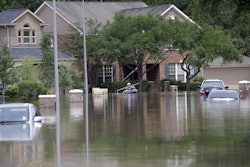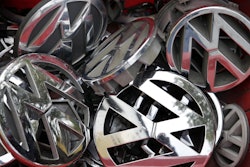Here are excerpts from recent editorials in Arkansas newspapers:
Northwest Arkansas Democrat-Gazette, May 3, 2016
Bringing home the bacon
When it comes to college athletics programs, the vast majority of universities pay to play.
In a 2015 report, USA Today found 24 of 230 public schools in the NCAA's Division I are financially independent, i.e., they bring in more revenue than they spend. Arkansas was No. 16, with eight other SEC schools having higher revenue. Half of those schools, according to the news organization, still receive some form of subsidy, but the University of Arkansas' program sends money back to the academic side of the ledger.
In short, for the Hogs, it pays to play, and to keep up with the demands of the sports-attending public.
That fact provides the strongest foundation for the Razorbacks athletic department's goal to launch a $160 million renovation and expansion of Razorback Stadium and a rebuilding of the Broyles Complex that now anchors the facility's north end zone. Many collegiate athletic programs simply don't have the financial strength to dive into long-term debt of that magnitude.
The University of Arkansas' robust financial picture in regard to athletics gives it an ability to be aggressive in its facilities-based play calling, and Athletics Director Jeff Long is ready for a drive to connect with more seat- and suite-buying fans. He will in the not-so-distant future ask the UA System board of trustees for authority to move ahead on the stadium expansion.
It turns out one of the plan's biggest obstacles is a soft-spoken, 81-year-old man. But not just any man. This is David Pryor, former state legislator, governor and U.S. senator who is now a member of the UA board. Pryor recently put Long and the UA's new chancellor, Joe Steinmetz, to work responding to a list of more than 30 questions about the stadium expansion's financial and construction details. In sum, the questions boiled down to "why" and "how."
In an April 21 letter, Steinmetz provided answers.
"We believe that this project is not only important for the future of the University of Arkansas," Steinmetz explained, "but also for the continued economic and cultural growth of our state."
That's big talk for costly project that will add less than 4,000 seats to the stadium, but UA administrators say it's not the quantity of seats, but the quality. Many of the added seats in an enclosed north end zone of the stadium will be the suites, club and loge seating that's proven popular and lucrative for the University of Arkansas. Athletic department officials want to pair the addition of those seats with a new Broyles Complex and other renovations/additions around the stadium that they say will improve the "game day experience" for all fans.
Pryor has been the plan's biggest skeptic, and even after getting answers to his questions, says he anticipates being the sole vote against the project.
"I think we have higher priorities than a football stadium, and it's not to benefit students," Pryor said. "I just do not think this is the right time to do it."
The retired senator, however, hasn't made his case convincingly, despite all his experience debating far more significant issues in the halls of the U.S. Senate.
The stadium project will provide revenues to maintain the self-supporting financial model for Razorback athletics as well as vital additional support for the continued investment in academic and other related programs benefiting all students at the University of Arkansas.
Pryor's concerns might resonate if the UA was like most schools, relying on student fees and other university subsidies to keep it athletics program going. But it's not. It's among the few in the nation that produce more money than it spends. Of the $160 million planned for the stadium project, about $40 million is set to be raised from donors, while about $120 million will come from issuance of bonds anticipated to paid back over the next 20 or so years through ticket and other revenue.
The money isn't being pried out of people's wallets. It's either being donated or paid through ticket purchases, TV revenue and other sources of funding generated by the athletic department's activities. Unless we've missed something, attending a Razorbacks football game or other sport is most certainly the epitome of disposable income. The Razorbacks have over the years proven capable of "selling" its athletic endeavors to fans, even when the win-loss records might suggest otherwise. As long as the proposed revenue comes from the athletics department's success, what's the point of opposing it?
As we noted in a previous editorial, Pryor deserves commendation for standing up to be counted. He's the only UA board member making a serious effort to force UA administrators to justify their plans. As one of the most beloved political figures in Arkansas history, he's uniquely positioned to stand firm against the UA, which is used to being the most influential force in any discussion.
Pryor has done a great job. It has helped to hear administrators articulate the plan for the stadium. But Pryor has not made a convincing and clear case as to why the stadium expansion would be harmful.
Without a question, the UA board's priority should be making sure no public tax revenue and no student fee money is used to pay for a stadium expansion. As for donations, well, it's up to donors to decide whether they want to put their money toward it. Donors, ticket buyers, suite lessors and other boosters of the program can always make their own decisions whether to support the teams and the program. There appears to be no shortage of support for the Hogs.
___
Texarkana Gazette, April 28, 2016
Complaints about Chinese-owned pulp mill are off the mark
Big news just about an hour away from the Twin Cities.
This week, Sun Paper announced plans for a $1 billion mill to be built in Arkadelphia, Ark., just up Interstate 30 from here.
Sun Paper is a Chinese company and this will be their first North American facility.
The new processing plant will convert wood into pulp, which will then be used to make paper. Construction is scheduled to start next year and should take about two and a half years.
When finished, the mill will employ about 250 workers. During the construction phase, about 2,000 will be working.
And more workers will be needed in the timber industry to supply the plant. Estimates range up to about 1,000 new jobs.
All this has been celebrated as a great thing for this part of the state. For the most part, at least.
As always, though, there are those with something negative to say. Especially in online comments on news stories and in social media.
The biggest complaint is that Sun Paper is a Chinese company. Why wasn't this an American company, some ask.
Also, the new plant comes with a nice package of tax incentives, grants and loans. Why isn't that money going to an American company, the same folks grumble.
The fact is any new business, American-owned or otherwise, can get incentives. That's just the way business is done these days.
And why a Chinese company? Because they are the ones who wanted to build a new plant. Simple as that. For years, Americans have been complaining about good jobs going overseas. Well, a Chinese company is bring jobs here. That's a good thing. We don't see why anyone would complain about it.
We would love to see American companies building plants all over our area_especially in Texarkana. But we'll happily take what we can get.
There may be other issues that arise that will cause us pause or concern. But these are not them.
Our big hope now is that some folks from here will be making that commute during the construction phase and after the mill is open for operation.
___
Arkansas Democrat-Gazette, April 28, 2016
It can't happen here
Of course that stuff can never happen here. That's so Chicago. Young people being foolish with guns. This is a small, wonderfully close-knit state, with well-mannered kids. The biggest trouble they get into might be on a particular Sunday morning when Dad notices the dent in the car.
That other stuff can never happen here. That's so New Orleans. Lord, yes, New Orleans. We have friends down there who don't go into certain parts of the city after dark, or before dark, either. You wouldn't believe the crime down in New Orleeens, land of dreams — and oft times nightmares. A man we know was once stationed at Jackson Barracks in the summers during National Guard training. He could hear the gunfire at night.
One memory of his sticks out: Driving down one of the wide avenues — was it St. Claude, or maybe Esplanade? — in the middle of the day, windows down, crowds on the street. A loud pop sounded, sorta like when cars used to backfire, and every member of the crowd hit the ground in unison. As they had been trained to do after years of living in New Orleans.
But that stuff can never happen here. That's so L.A., and we don't mean Lower Arkansas.
Around here, the guns our kids carry are the long kind, for hunting turkey and ducks. Our kids don't hang out at night clubs; they have deer camps. Our kids go to church. They do their homework. They're in bed by 9.
Okay, okay, so maybe it can happen here — but only Over There around here. You know, in the city. But out in the suburbs? Where tomato gardens outnumber stop lights? That stuff doesn't happen there. So all our kids have to do is avoid the more dangerous parts of the big city, and they'll be fine. It can't happen around here. Not exactly here, anyway.
Until it does. And the papers are filled with one story, then two stories, then more stories and followups, and your kids want to read the newspaper because they knew the dead boy, or the jailed boys, or played ball against one of the accused, or knew the man who was injured, or know the mom of somebody involved. And all of a sudden, it can't happen here sounds as stupid as it always was.
The past week has opened a lot of eyes in central Arkansas. Or should have. Talk to your kids. Right about now, they might actually talk back. And it might do all of us some good to listen.






















